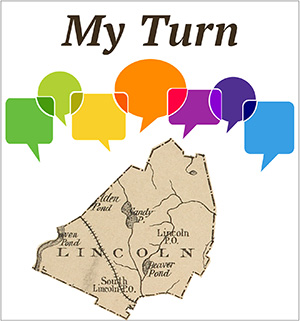By Barbara Slayter
What is at stake in this election? The very survival of our democracy!
On Saturday, Sept. 14, the Lincoln Democratic Town Committee kicked off its 2024 election events with a talk by Michael Ansara, political organizer, longtime activist, and poet whose work contributes to our understanding of justice, political choices, and effectiveness. Led by LDTC co-chairs Joan Kimball and Travis Roland, an attentive audience of about 40 Lincoln residents greeted Ansara, and we were not disappointed. His astute analysis, informal style, savvy political perceptions, and grasp of critical facts were apparent throughout the morning.
Ansara — organizer for Together 2020, a board member of Indivisible Massachusetts Coalition, and a founder of Volunteer Blue — has spent many years as an activist and an organizer on political campaigns, voter registration efforts, and civil rights. He opened his comments with recognition that this is the most consequential election of our lifetime. People with autocratic inclinations and extremist ideologies are threatening our democracy and we — all of us — need to defend it as best we can in this upcoming election.
Ansara asserted that electoral victories in certain states are critical to a Democratic win. For the presidency, there are seven swing states that will determine the outcome: Arizona, Nevada, Pennsylvania, Wisconsin, Michigan, Georgia, and North Carolina. For the Senate retaining seats in three states is essential: Ohio, Arizona, and Montana. For the House, which Ansara believes Democrats have a good chance of taking, the critical states are New York and California.
What is the single most effective action members of grassroots organizations like the Lincoln Dems can do to bring about a Democratic victory? Register voters and assure that they are able to vote. And the most effective way to do that is to talk with them. He urged members of the audience to do several things:
- Look at that list of critical states and figure out who you know in those states, whether relatives, friends or distant colleagues. Contact them, have a conversation about what’s at stake in this election, and persuade them to vote.
- Spend some time canvassing, especially in areas where low voter turnout is prevalent. Ansara noted how much Trump benefited from canvassing in 2020 as opposed to the Dems, who scaled back due to Covid. Moreover, Trump, he asserted, can’t win without taking North Carolina, a highly purple and key swing state. (Groups are going regularly from Massachusetts to canvas in North Carolina and Pennsylvania.)
- Make phone calls. Starting next week, phone banks will be calling known Democratic voters and encouraging them to vote early.
These tasks may seem small and unimportant, but in a tight election with a deeply polarized public, such efforts can make a critical difference. Some day, Ansara said, your grandchildren will ask, “What did you do when democracy was so profoundly threatened?” You want to be able to say, “I gave it my all.”
Ansara spoke for about half an hour and then fielded a great variety of questions from a politically engaged and savvy audience, including:
- Why has North Carolina become a critical state? (Answer: changing demographics and a revitalized, younger more focused N.C. Democratic Committee)
- Are Democrats writing off the Midwest? (Answer: there is a new emphasis on Midwest voters, including persuading Democrats to challenge races even if they can’t win and working on getting out the rural vote.)
- How do you explain the gender gap in voting? (Answer: partially by Trump’s successes in engaging young men who are not college graduates, and widespread concern among women about reproductive rights)
- Why are journalists treating Harris and Trump so differently? (Answer: journalists want a horse race when they should be comparing policies)
Ansara identified two local organizations in which he has great confidence: Force Multiplier and Volunteer Blue. The latter’s webpage has important information including a calendar of opportunities for political activism in key races and swing states as well as a volunteer coach who will help people with canvassing, texting, and phone banking.
In sum, voter contact is essential, talking with people face-to-face is the most effective way to get out the vote, and getting out the vote is central to winning this election, whether we are talking about the Presidency, the Senate, the House, or down ballot. Drawing on Michelle Obama’s oft-quoted phrase, Ansara urged us to “do something” — inspiring many of us to head to the activities table to sign up for canvassing or purchase a yard sign, dig more deeply into our pockets, and make that telephone call to a friend or relative in a critical state.
For more information about the LDTC, check the website at lincolnmadems.org and follow us on Instagram (lincolnmadems). For opportunities to canvas and to write postcards to swing states, contact Travis Roland at travisroland89@yahoo.com or Joan Kimball at selene@gmail.org.
“My Turn” is a forum for readers to offer their letters to the editor or views on any subject of interest to other Lincolnites. Submissions must be signed with the writer’s name and street address and sent via email to lincolnsquirrelnews@gmail.com. Items will be edited for punctuation, spelling, style, etc., and will be published at the discretion of the editor. Submissions containing personal attacks, errors of fact, or other inappropriate material will not be published.

Leave a Reply